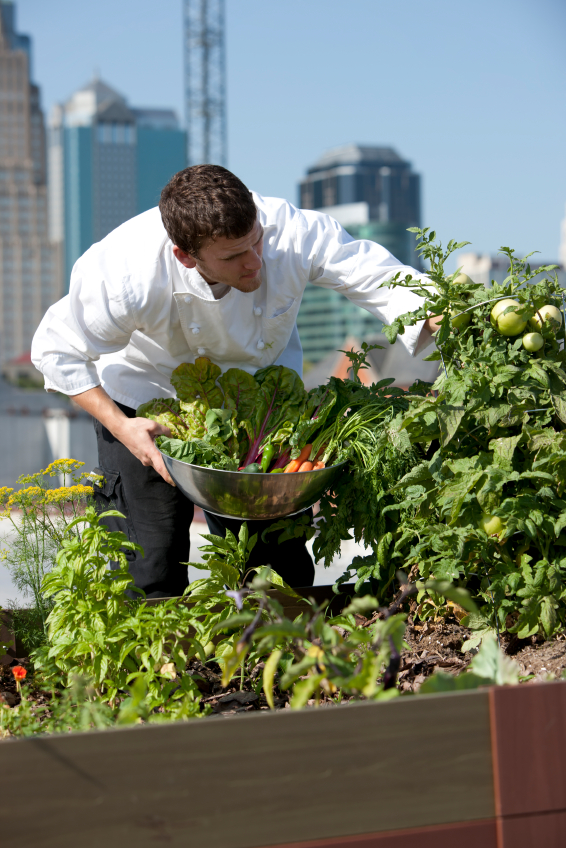 Chef Harvests Herbs and Vegetables from Urban Restaurant Rooftop Garden. iStockphotoDon't hold your breath for the USDA or a major health organization to recommend the Paleo diet. There is not enough of this food to go around; the diet will not "scale."
Chef Harvests Herbs and Vegetables from Urban Restaurant Rooftop Garden. iStockphotoDon't hold your breath for the USDA or a major health organization to recommend the Paleo diet. There is not enough of this food to go around; the diet will not "scale."
However, there is a glimmer of hope in the form of urban farming. In cities throughout the country, the movement is slowly taking shape. This Sunday, we look at some of the recent activity.
In the Salon article, Urban gardens: The future of food?, Will Doig writes:
Right now, urban-grown produce represents a minuscule slice of the food system. But there are several plausible scenarios that could make such food more commonplace in the city kitchen of the future.
...urban farming may carve a path to sustainable success by creating a new type of subsystem within the larger food system — one that’s bigger than boutique but smaller than Big Agra.
More importantly, as noted by urban agriculture pioneer Dr. Dave Schemberger, locally grown food is healthier:
Chronic illness is exacerbated by eating hollow food which has lost its nutritional value from spending too much time on a truck or grocery store shelf. We can prevent and reverse much of the disease found in our modern life by avoiding processed food and consuming more raw fruits and vegetables close to the time they are harvested.
(However, cooking has it's benefits. Cooking increases access to nutrients in some foods and is believed to have been important in the expansion of the hominid brain.)
Many U.S. cities have active urban farming programs. Last year, San Francisco passed the Planning Code Amendment on Urban Agriculture making commercial garden and small farm sites legal in the city. This year, "Atlanta Mayor Kasim Reed will break ground on the Trinity Ave. farm across from City Hall". A planning department’s proposal in New York City, if approved, would allow "1,200 acres of empty, flat rooftops" to be "eligible for green penthouses."
To find urban farming activities near you, do an online search on "urban farming" and the name of your community.
Want to become an urban farmer? Try this guide by Novella Carpenter and Willow Rosenthal: The Essential Urban Farmer. Hannah Wallace interviews the authors and poses a number of questions including:
Starting an urban farm demands a lot of work–not to mention money. You need to pay for water, buy liability insurance, equipment, wood and nails for raised beds, maybe even hoop houses. Are there funds would-be gardeners can apply for if they don’t have enough of their own money?